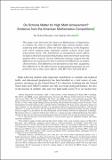Do Schools Matter for High Math Achievement? Evidence from the American Mathematics Competitions
Author(s)
Ellison, Glenn David; Swanson, Ashley Terese
DownloadEllison_Do schools matter.pdf (672.9Kb)
PUBLISHER_POLICY
Publisher Policy
Article is made available in accordance with the publisher's policy and may be subject to US copyright law. Please refer to the publisher's site for terms of use.
Terms of use
Metadata
Show full item recordAbstract
This paper uses data from the American Mathematics Competitions to examine the rates at which different high schools produce high-achieving math students. There are large differences in the frequency with which students from seemingly similar schools reach high achievement levels. The distribution of unexplained school effects includes a thick tail of schools that produce many more high-achieving students than is typical. Several additional analyses suggest that the differences are not primarily due to unobserved differences in student characteristics. The differences are persistent across time, suggesting that differences in the effectiveness of educational programs are not primarily due to direct peer effects.
Date issued
2016-06Department
Massachusetts Institute of Technology. Department of EconomicsJournal
American Economic Review
Publisher
American Economic Association
Citation
Ellison, Glenn, and Ashley Swanson. “Do Schools Matter for High Math Achievement? Evidence from the American Mathematics Competitions†.” American Economic Review 106, no. 6 (June 2016): 1244–1277.
Version: Final published version
ISSN
0002-8282